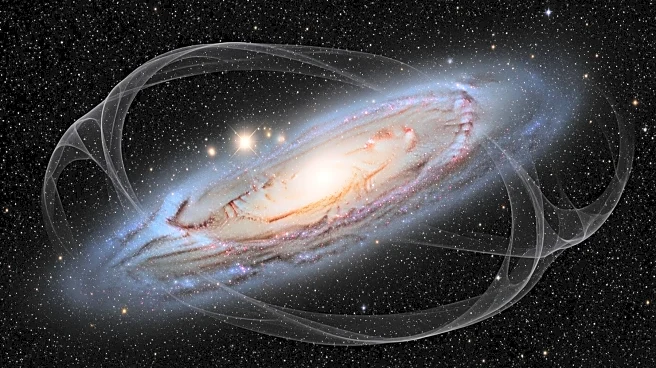What's Happening?
Recent calculations by Henry Tye, a physicist at Cornell University, suggest that the universe will end in a 'big crunch' approximately 20 billion years from now. This conclusion is based on updated dark
energy data, which indicates that the cosmological constant, a concept used to describe the universe's expansion, may be negative. Historically, it was believed that the cosmological constant was positive, implying indefinite expansion. However, Tye's model, which incorporates new data from observatories like the Dark Energy Survey and the Dark Energy Spectroscopic Instrument, suggests a future where the universe contracts back into a single point. This model proposes a hypothetical particle that behaves like a cosmological constant early in the universe's life but does not anymore, tipping the constant into negative territory.
Why It's Important?
The implications of a 'big crunch' scenario are profound for cosmology and our understanding of the universe's lifecycle. If the cosmological constant is indeed negative, it challenges the long-held belief that the universe will expand forever. This could reshape theories about the universe's fate and influence future research directions in cosmology. The findings also highlight the importance of dark energy, which constitutes a significant portion of the universe's mass-energy content. Understanding its role could lead to breakthroughs in physics and cosmology, potentially affecting how scientists approach the study of cosmic evolution and the universe's ultimate destiny.
What's Next?
Further observations and data collection are expected from various dark energy observatories, including the Zwicky Transient Facility, the European Euclid space telescope, and NASA's SPHEREx mission. These efforts aim to refine the understanding of dark energy and its impact on the universe's expansion. As more accurate data becomes available, scientists will continue to test and validate Tye's model, potentially leading to new insights into the universe's structure and behavior. The ongoing research could also prompt discussions among cosmologists about revising existing models and theories to accommodate these new findings.
Beyond the Headlines
The ethical and philosophical implications of the universe having a definitive end are significant. It raises questions about the nature of existence and the ultimate fate of all cosmic structures. Additionally, the research underscores the importance of international collaboration in scientific endeavors, as data from observatories worldwide contribute to a more comprehensive understanding of the universe. The study also highlights the role of theoretical models in advancing scientific knowledge, demonstrating how new hypotheses can challenge established paradigms and drive innovation in the field.









